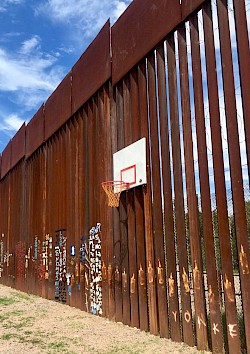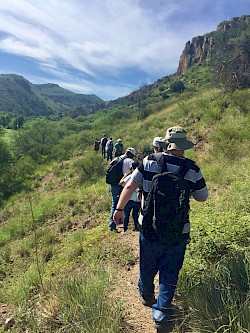THEOLOGICAL REFLECTION
Weaponizing the desert
Reflections from an MTSO delegation’s trip to the border
By Leigh Precise
Executive Assistant to the President
for Strategic Initiatives and Advancement

The lectionary gospel text for Sunday, Aug. 18, was Luke 12:49-56. As I read the text that morning, I was struck by its harsh tone, containing words such as fire, stress, division and hypocrites. The verses describing the division of households – “three against two and two against three” – were unsettling. Since I was reading this in my bunk at the beginning of Day 4 of an MTSO delegation’s five-day BorderLinks experience, however, I was somehow better able to sit with the discomfort. I carried this text with me as we traveled south on I-19 from Tucson to Nogales.
For more than 30 years, the BorderLinks organization has offered learning trips to educate delegations about the policies and circumstances that affect people who live near the U.S.-Mexico border and to practice solidarity with migrants. Our MTSO delegation was composed of four students, two faculty, two staff persons and one trustee.
In Nogales, the idea of division looms as large as the border wall. As construction of the wall began only 25 years ago with Operation Safeguard, its presence divides a city that once was whole. It seems arbitrary and harsh. It is massive.
The gaps between slats were once wide enough to reach through to hold a hand or share a meal. No more. The U.S. installed additional barriers so that those types of exchanges are now impossible. The barbed wire added along the top of the U.S. side of the wall in recent years is evocative of a maximum-security prison.
Our guide in Nogales was Manuel Morales. He spoke with us about his experience living in Nogales, Sonora (on the Mexican side), and took us see the memorial for Jose Antonio Elena Rodriguez. While throwing rocks toward the border wall from his neighborhood in Nogales, Sonora, Rodriguez was shot and killed through the wall by U.S. Border Patrol agent Lonnie Ray Swartz on Oct. 10, 2010. Rodriguez was 16 years old. Swartz was found not guilty of voluntary manslaughter in 2017 and acquitted of involuntary manslaughter in 2018.

The day before going to Nogales, our delegation had hiked through part of the Sonoran Desert near the U.S. border town of Arivaca for a water drop with a volunteer from No More Deaths, a humanitarian aid organization based in southern Arizona. The increasing efforts to seal urban ports of entry with physical barriers, technological surveillance, and Border Patrol and military staffing has driven more migrants to traverse the desert, despite the fact that the journey can put them in mortal danger. The water drop allowed us to leave gallons of clean water and cans of food in a location where migrants are known to travel.
Since the 1990s, the U.S. government has embraced “prevention through deterrence” at the border. Our delegation’s experiences and conversations made it clear to us that it’s not working. Warsan Shire’s poem Home begins: “no one leaves home unless home is the mouth of a shark, you only run for the border when you see the whole city running as well.”
The U.S. Visa Bulletin for September 2019 states that F1 visas from Mexico currently under consideration were filed prior to Aug. 1, 1996. With that backlog, you realize no one is waiting 23 years for a chance to enter legally. Our government has turned the desert into a weapon, but migrants are willing to take any risk to better their lives and those of their families.
At the end of the lectionary text from Luke, Jesus shouts, “You hypocrites! You know how to interpret the appearance of earth and sky, but why do you not know how to interpret the present time?” May God help us with the interpretation and lead us to action.
Methodist Theological School in Ohio provides theological education and leadership in pursuit of a just, sustainable and generative world. In addition to the Master of Divinity degree, the school offers master’s degrees in counseling, practical theology, social justice and theological studies, along with a Doctor of Ministry degree.
CONTACT:
Danny Russell, communications director
drussell@mtso.edu, 740-362-3322